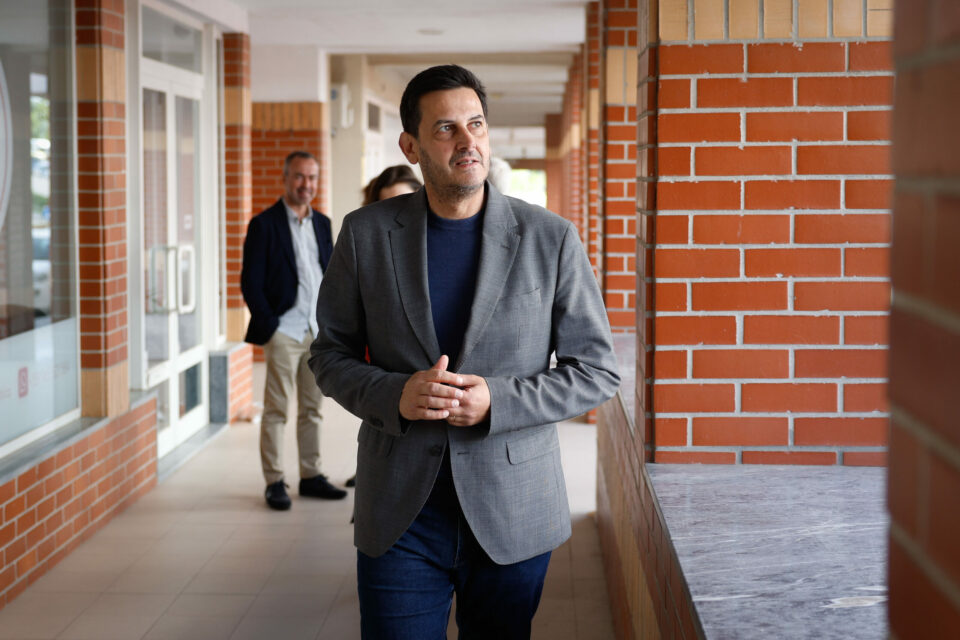#tactics #fool #officials #Fialos #adviser #revealed
Perhaps better times await the Czech economy again. However, in order to really move forward, the government must complete the pension reform, stimulate the labor market and cut unnecessary bureaucracy, says economist and adviser to the Prime Minister Štěpán Křeček.
The Czech economy is finally beginning to revive after many months of pessimistic development. The mood of households and companies started to turn for the better in March, and they are once again more willing to spend. This is indicated by data from the Czech Statistical Office (ČSÚ), according to which, after two months of decline, confidence in the Czech economy rose in March and is the highest since last May.
“We talked about it here (in Ptám se já, editor’s note) at the end of last year, and at that time many people blamed me for being too optimistic. Now it turns out that I was not an optimist, but a realist. When I talked about defeating inflation, it happened, inflation is back on target (at two percent, editor’s note),” said economist Štěpán Křeček. And he pointed out that food prices in the Czech Republic are falling the fastest in the entire European Union, and their prices should continue to fall slightly.
However, in order for the economy to really start up again, according to Křeček, reform changes to pensions must be carried out, the labor market should be stimulated and various permit processes simplified. In his words, the prime minister’s adviser has been trying to clean up the overgrown bureaucracy for two years. At the same time, he has anti-bureaucratic packagethe latest version of which was prepared by the Chamber of Commerce.
According to Křeček, however, Czech officials have to be bypassed: “It is necessary that as many points as possible from the material be enforced. We have different strategies and tactics to trick the officials to actually make it happen. Some have already been implemented. And I believe that as much of it as possible will be realized. It’s a complete simplification that goes across different departments.”
You can also listen to the entire interview in the audio player, in your favorite podcast app, or in the video below.
How would you describe the current state of the Czech economy?
We talked about it here (in Ptám se já, editor’s note) at the end of last year, and at that time many people accused me of being too optimistic. I am glad that now it turns out that I was not an optimist, but a realist. That when I talked about beating inflation, it happened, inflation is back on target.
At the same time, we see that the economy is slowly getting started. After a year and a half, merchant sales have finally started to grow and overall I would say that the mood is starting to improve. Real wages will rise this year, so I believe that people will also have a higher standard of living and the mood will continue to improve. Next year at the latest, economic growth will be even stronger than this year. And since we have beaten inflation and we continue to see tension in the labor market, it is obvious that real wages will rise.
Video interview with economist Štěpán Křeček. Video: Marie Bastlová, Seznam Zpravy
And what about food prices?
At the moment, food prices in the Czech Republic are falling the fastest of all the countries of the European Union, already since December, so a quarter of the year – December, January, February. And it can be expected that we will continue to maintain our leadership in this regard. So food prices should still be slightly cheaper. And I think everyone noticed in stores before Easter that, for example, the prices of eggs, flour, dairy products… so ordinary people will feel it too.
From your point of view, is it appropriate for the Czech National Bank to speed up the reduction of interest rates, or do you think the gradual pace set by the bankers is fine?
From the very beginning – and it was very unpopular, but I still did it – I defended the course of action of the new bank board, when we set out on the path of interest rate stability. And after we won the fight against inflation, we started lowering those interest rates.
That is the better solution, the one we chose, because the cost to the whole economy would be enormous.
I think it was okay. Nevertheless, we managed to beat inflation very quickly, but now it is necessary to continue this regime in order to reduce the interest rate carefully, gradually.
How will it be with the availability of housing? Will the government get more involved? According to experts, this is one of the essential ways to secure oneself in old age.
I think it’s an extremely burning question from all possible angles. I am convinced that the best possible insurance for old age is the acquisition of your own real estate. And now we are preventing this from the younger generation. I am convinced that this is primarily due to insufficient construction. All kinds of regulations prevent us from doing so. If we face the truth, in short, the fact that permit processes last for example ten years in Prague makes the apartment extremely expensive.
Interest rate cuts themselves are double-edged. Mortgages will increase the demand for the purchase of housing, the high demand will meet the limited supply and, in turn, the real estate prices will increase significantly. So housing availability will drop again. It’s just not a long-term solution. We need more construction.
But I understand it to mean that a very big shift in the permitting processes and construction did not succeed?
Not yet. It is underbuilt, I think that will continue. The new construction law will improve a little, certainly the digitization of construction procedures, if it can be completed. But I’m afraid the regulations, they’re just always there, and it’s a constant struggle.
When we talked about the same topic in December, you – and not only you – mentioned that the basis for restarting the Czech Republic was to release all the permit processes. For example, how do you perceive the protests of municipalities from South Moravia, where a high-speed train track is to be built, and the municipalities want the high-speed trains to slow down in their vicinity because they would be too fast?
It’s bullshit, because it makes no sense to build an expressway because we’re going to slow it down. Of course, if only locals vote in that referendum, they will be against it. So we won’t build anything here. Can we say that we want to turn the Czech Republic into an open-air museum, will we sink in the economic rankings, or do we want to make the Czech Republic a modern, prosperous one that gives the next generations a chance? But then we just have to move.
Among the measures that the government should still take, you also mentioned the anti-bureaucratic package, which you adopted as your own. How is this going? You brought him here…
It’s probably the first time I’ve brought any papers to the studio, but I wanted it to be seen that when I said I was taking it as my own, something was happening around it. Here are 59 pages of concrete measures to simplify bureaucracy in this country. I would like to thank the Chamber of Commerce, which processed it. Now it is necessary to make as many points as possible from the material. We have different strategies and tactics to trick the officials to actually make it happen. Some have already been implemented and I believe that as much as possible will be implemented.
It is a complete simplification that goes across various departments, but it also applies to other organizations, for example reporting to the Czech Statistical Office. Wherever various inefficiencies arise, when, for example, the same data has to be sent a second time, when people circulate, not papers, when it simply gets stuck and hinders development. Then all those processes drag on.
So this is a set of measures that do not need legislative changes?
He needs The idea is that whenever there is a legislative change in that department, I will try to sneak in a few more changes to their proposal as part of the amendment proposals and comment procedures, which I will tick off here. And when the amendment enters into force, part of the unnecessary bureaucracy will be abolished, among other things. So I’m hoping that now that I’ve revealed it, the officials won’t stop me all the time.
And what does the Prime Minister say about that? Is that your idea or his?
I’ve been doing the comment procedures for two years now, and I think that on the one hand, we saved the Czech Republic a lot of money thanks to my comments, but I think that in the end it improved the laws as such. For example, I worked a lot on the capital market law, which is generally not understood by politicians.
What other changes would you like to implement?
For example, there are still questions about the construction industry. I consider it absolutely absurd that, for example, today we have such building regulations that Vinohrady, a premium Prague district where basically everyone would like to live, could not be built according to today’s building regulations, because they do not meet them.
And is there no other way to enforce changes than to trick the officials?
How was the legendary series Sure, Mr. Prime Minister, I often feel like I’m living that series. But I find my ways. When I started as a consultant, the first thing I mentioned everywhere was that civil servants had to be fired. And the moment they get scared that they might actually lose their job, they listen a little more. If we push for their existence, then they will put aside those other needs a little and then something can be achieved.
What are the main priorities of the government until the end of the election period?
Of course, the priority is to complete the pension reform. A priority for the entire government, because if it falls under the table now, the next government will lose two years again, that will be four years from today, and we need that change quickly. Changes to the labor code, moving the market, that is also a big task. And then if we reduce the bureaucracy, I think it will be a success.
Should the government stick with the idea of layoffs without giving reasons?
For me, if you want to hear my unpopular advice, then yes. But I understand that people who don’t understand say something else.
I am asking, Marie Bastlová
Podcast Marie Bastlova. Hard talk interviews with people who have influence, responsibility, information.
You can find an archive of all parts here. Write us your observations, comments or tips via social networks under the hashtag #ptamseja or by e-mail: [email protected].









